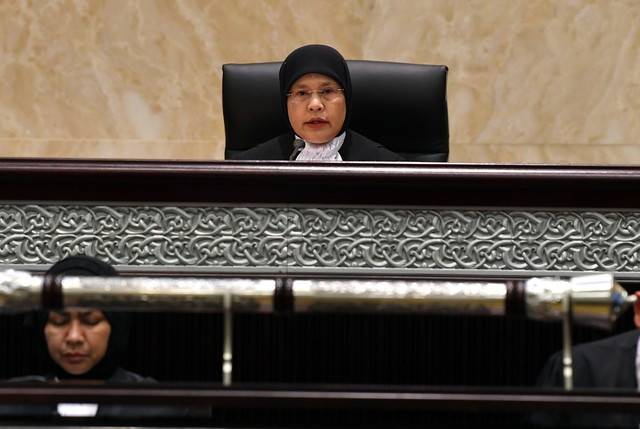Syariah Court, Islamic laws will not fade into oblivion - Chief Justice

PUTRAJAYA - The petition filed by two women in challenging the constitutionality and legality of 18 provisions in the Kelantan Syariah Criminal Code (1) Enactment 2019 has nothing to do with or affect the position of Islam or the Syariah Court in the country, said Chief Justice Tun Tengku Maimun Tuan Mat.
She said the issue that the court needed to decide was whether the Kelantan State Legislative Assembly made the provisions in accordance with the limitations set by the Federal Constitution or otherwise.
"In other words, the issue before us has nothing to do with the position of Islam or the Syariah Court in the country.
"Whether (the position of) Islam or the Syariah Court is maintained or otherwise is not a question in this case," said Justice Tengku Maimun who led a nine-member panel of the Federal Court when reading out the judgment in the case.
The Federal Court in an 8-1 majority decision today, in allowing the application by the two women, ruled that 16 provisions in the Kelantan Syariah Criminal Code (1) Enactment 2019 were null and void.
The two women, Nik Elin Zurina Nik Abdul Rashid, who is from Kelantan, and her daughter, Tengku Yasmin Nastasha Abdul Rahman, filed the petition to the Federal Court in accordance with Article 4(4) of the Federal Constitution and named the Kelantan State Government as the sole respondent.
They claimed that the Kelantan State Legislative Assembly (DUN) did not have the authority to legislate on the 18 offences because there is a Federal law that covers such offences.
Justice Tengku Maimun, in her summary judgment, said that if a party challenged a law enacted by the State Legislature and implemented by the Syariah Court on the basis that the State Legislature does not have the power to enact certain laws, and if the Civil Court allows the challenge, neither the challenging party nor the Civil Court can be considered as acting against God.
This is because the law being challenged is not formulated by Allah, but by the state legislative body, nor does it imply any failure on the part of the Civil Court to uphold the position of Islam or to empower the Syariah Court, she said.
"The Syariah Court or Islamic law in Malaysia will not be undermined or relegated to oblivion, as claimed by lawyer Yusfarizal Yusof, because the Federal Constitution guarantees legislative authority to all State Governments to enact laws - laws that are enforced by the Syariah Court.
"It is reiterated once again that the subject of this petition is not the position of Syariah law in Malaysia,” she said.
She also said that the allegations by the petitioners were specifically on the actions of the Kelantan State Assembly, which they described as "gone beyond the power on the types of offences that can be approved by the State Government, within the scope set by the Federal Constitution”.
She said there are three types of punishment under Islamic law, namely hudud, qisas and takzir.
The hudud punishment is a punishment that has been determined by Allah, while qisas means to inflict a similar punishment on the offender as has been caused to the victim.
"Like hudud, qisas is also determined by Allah. The difference between hudud and qisas is that this qisas punishment must be claimed by the victim or the victim's family. Diyat which means compensation or damages is part of the qisas punishment.
"Takzir is a punishment that is not determined by Allah but the rate and form of punishment is determined by the government and will be imposed on criminals at the discretion of the judge," she said.
The Chief Justice said that as of today, the Syariah Court in Malaysia has not implemented hudud or qisas, but only takzir, like Civil Court.
She said there is no difference between the Syariah Court and the Civil Court because both courts mete out the takzir punishment.
The only difference is that the takzir punishment meted out by the Syariah Court is based on the law set by the government at the state level and passed by the State Assembly while the takzir punishment carried out by the Civil Court is in accordance with the law set by the government at the federal level and passed by Parliament, she the judge.
"I would also like to mention that the takzir punishment by the Syariah Court is subject to the Syariah Courts (Criminal Jurisdiction) Act 1965 (Act 355) which limits the prison sentence to a period not exceeding three years, a fine not exceeding RM5,000 and whipping not exceeding six times,” she said. - BERNAMA
Download Sinar Daily application.Click Here!














